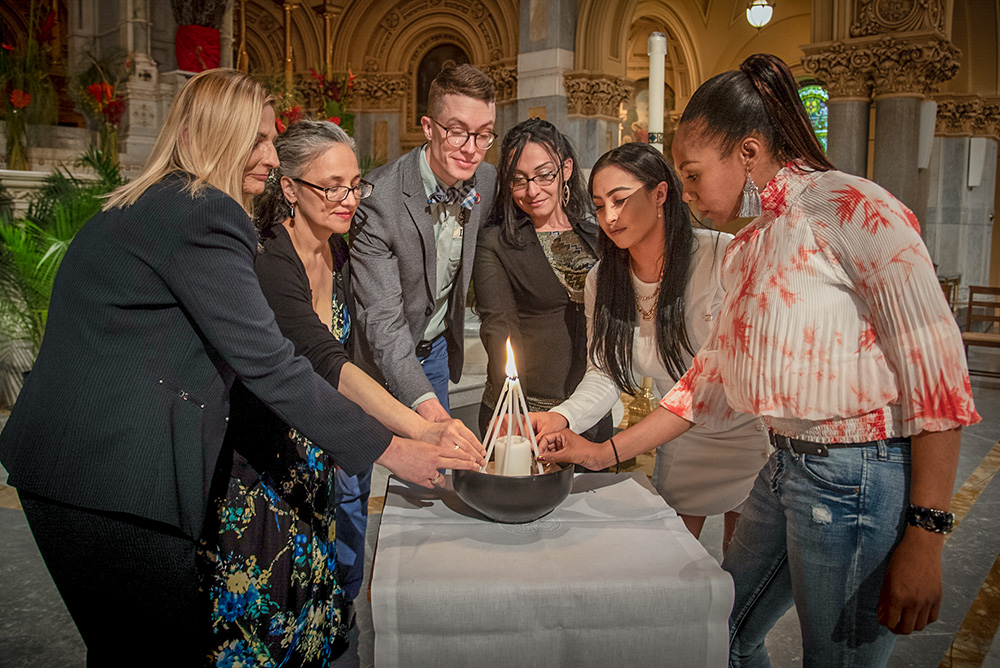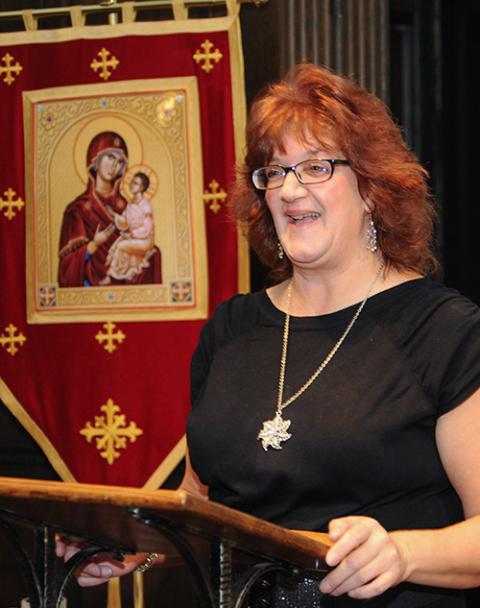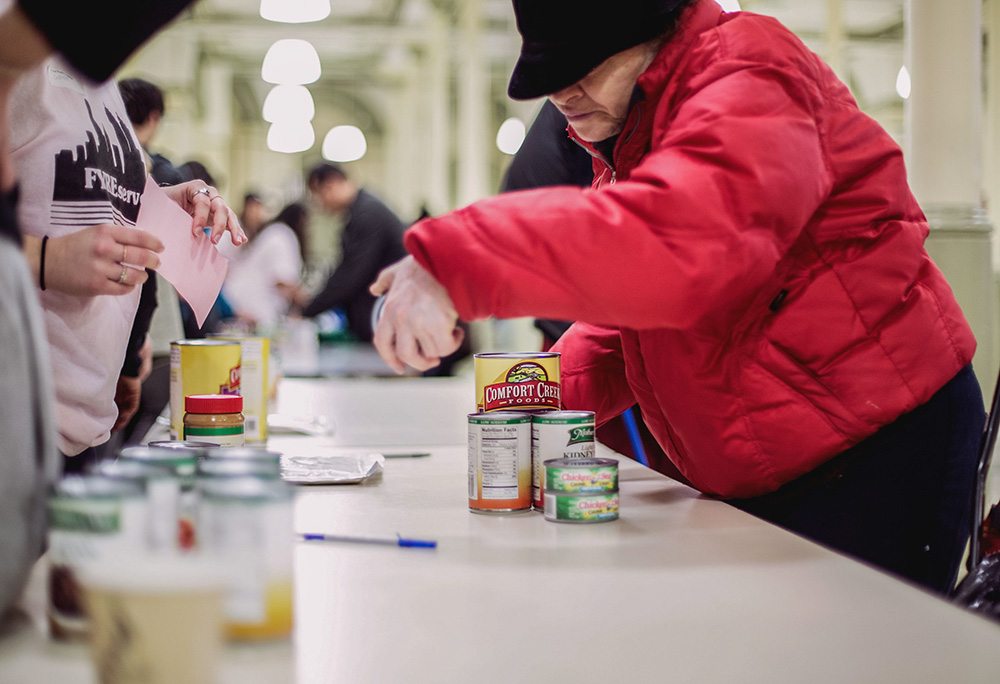
Graduates of Xavier Mission's Life Skills Empowerment Programs, or LSEP, take part in a candle-lighting ceremony at St. Francis Xavier Church in New York City in May 2018. The ceremony is intended to signify the community of the participants in the program, as individuals joining together in one unit. (John Langdon)
Rosella was 55 years old when she lost her job as a receptionist for an insurance adjuster in 2009. She was laid off following the Great Recession in which hundreds of thousands of Americans became unemployed. After about two years of part-time jobs and failed attempts to secure a new full-time position, she had to leave her home in February 2012 because she could no longer pay rent.
For Rosella, who had been born and raised in that neighborhood, it marked a blow that affected her mental health forever.
Rosella, who preferred not to share her last name with NCR for privacy reasons, spent nine months in a women's shelter in Brooklyn, where she developed depression and began to experience strong suicidal feelings.
"It was horrible. I was bullied all the time. I was physically, emotionally and mentally abused. Almost every day, people were trying to beat me up for no reason. I couldn't handle it," she said in an interview with NCR, crying quietly.
She recalled having one thought running through her head, escalating as she received constant job rejections during the day and was harassed in the shelter at night: "I should just kill myself."
That same summer, however, Rosella learned that a Catholic-inspired, independent, nonprofit organization called Xavier Mission had organized a program for homeless people called "LSEP" — which stands for Life Skills Empowerment Programs — that offered financial, logistical and educational support for New Yorkers who had lost their homes.

Rosella speaks at her LSEP Graduation hosted by the Xavier Mission in New York City, December 2012. (John Langdon)
Not only did Rosella successfully graduate from the program after 14 weeks in December 2012, but she also decided to start participating in the program as a volunteer by going around to shelters recruiting.
Her application to get a "supportive housing" apartment in the Bronx, where she still lives today, was accepted in October 2012, and with welfare support she began to be able to pay her rent again. Rosella could not have imagined, however, that a few years later she would find herself at risk of eviction again, and again in need of support from Xavier Mission.
In the wake of the COVID-19 pandemic, Xavier Mission created a new Financial Assistance/Eviction Prevention Program to support families in New York City. The program, which aids families and individuals with unpaid rent and other critical expenses such as utilities, medication and internet, has seen a surge in demand since the expiration of enhanced unemployment benefits and the end of the eviction moratorium in New York.
The pandemic's economic fallout left many jobless and unable to pay rent. Though some have returned to work, they often earn too little to cover both current and overdue rent. Others still struggle to find employment.
Immigrant families, often ineligible for government rent assistance, rely heavily on charitable organizations like Xavier Mission to remain in their homes. Without this support, they face the looming threat of eviction.
Eviction is a primary driver of homelessness in New York City, bringing significant trauma to those affected. The intervention of the Financial Assistance/Eviction Prevention Program helps families avoid the destabilizing impacts of eviction and homelessness, which can have profound lifelong effects, particularly on children.
"People who have worked their entire lives and had never had an issue with poverty or housing suddenly found themselves on the brink of eviction and without a job, and in a place where they never thought that they could be. It can happen to almost anybody, and it can happen very quickly," said Cassandra Agredo, executive manager of Xavier Mission.
"It's not about people being lazy, or not wanting to work," she said. "In many cases, it's people not being able to find work, not being able to work for many legitimate reasons, illness, injury, age, and in some cases it's bad luck, or people falling on hard times."

Xavier Mission hosts a food pantry distribution at St. Francis Xavier Church in New York City in 2018. (Ashley Mosher)
According to the Coalition for the Homeless' "State of the Homeless 2022" report, 640 homeless New Yorkers died in 2021, with 76% of those who died sheltered and 24% unsheltered. The pandemic exacerbated these issues, causing 31 deaths due to COVID-19 among shelter residents. Additionally, 16 homeless individuals died from exposure to extreme cold and two from heat.
The report also highlighted the systemic challenges homeless families face in securing temporary housing. In 2021, an average of 13% of homeless families with children and 30% of homeless adult families had to submit six or more applications before being deemed eligible for temporary housing. This bureaucratic labyrinth adds to the trauma of eviction and forces families into precarious living situations while they wait for shelter.
Thinking back to the causes that prompted her to seek Xavier Mission's help again, Rosella explained that being on Medicare posed significant financial challenges for her, since it does not cover many expenses. She had to pay out of pocket for prescriptions and other medical needs, leading to financial strain. Although she found a free dental program, Medicare still did not cover eyeglasses and eye exams, which she hadn't had in many years.
Then, after turning 65 two years ago, Rosella expected to be transitioned from disability to retirement benefits due to her extensive work history of 38 years. Despite anticipating this change and continuing to receive checks, in March 2024, she suddenly discovered there was no money on her card.
Advertisement
Upon contacting the card company, she was directed to Social Security, where she learned that forms had been sent in February for her to complete the transition to retirement. Rosella said she did not receive these forms, and her benefits were subsequently halted.
After visiting the Social Security office, she was informed that the transition process takes 60-90 days. During this period, she has relied on Xavier Mission to assist with her rent, utility and cable bills, including Wi-Fi.
"I don't like asking for help. I didn't want to ask for help, and I let it go until the very last minute, when my electrics was going to be turned off. I hate to call for help, and now I have no income," said Rosella. "They give me food, too, because I've been a pantry client for years, but now they've been delivering it to me, but it's just not enough. I can't do my laundry because I have no cash. I mean, it's just horrible."
In the last fiscal year, the Financial Assistance/Eviction Prevention Program assisted about 90 families with $200,000 in rent payments, saving New York taxpayers more than $9 million in shelter costs. Additionally, 32 families received $35,000 for essential expenses like utilities, internet and medical bills.
Despite these successes, the program faced funding shortages, forcing it to close to the public in February and only provide emergency assistance, at least until the end of the fiscal year, which will be the end of August 2024.
The demographics of Financial Assistance/Eviction Prevention Program applicants reflect broader societal inequities. Eighty-one percent identify as African American, African Caribbean or Black, and 15% as Hispanic/Latino.
A significant portion, 37%, are disabled, while 32% are actively seeking work or employed temporarily, 21% are part-time employed, and 10% full-time employed. Despite varying employment statuses, all are at risk of eviction, with around 40% already in housing court.
'It's far less expensive to help somebody pay their rent arrears and stay in their apartment than it is to pay for them to be in a public shelter.'
—Cassandra Agredo
According to Agredo, there are two perspectives to view favorably and embrace the ethics of eviction prevention. "If you're thinking about it from a compassion, empathy perspective, one of the most basic human rights is the right to safe housing. Everyone should have a safe place to live, they shouldn't have to be on the street, they shouldn't have to live in a shelter. They shouldn't have to live on someone's couch," she said.
"If you're looking at it from a financial perspective — which I think a lot of people are very fiscally conservative — I would say that it's far less expensive to help somebody pay their rent arrears and stay in their apartment than it is to pay for them to be in a public shelter. It costs about $100,000 to shelter a family for a year and a half," she added. "If they have $30,000 in rent arrears, well, obviously, it's way more fiscally prudent to help them pay their rent arrears and stay there."
As the need for eviction prevention continues to grow, the challenge remains to secure sustained funding for programs like the Financial Assistance/Eviction Prevention Program. The program's track record demonstrates that with adequate resources, it can effectively mitigate the crisis, keeping families housed and averting the long-term social and economic costs of homelessness, Agredo said.
Despite constant economic challenges and her struggle with depression, Rosella said she has not lost her faith and continues to believe in God. Going to church proves difficult for her, as she does not have the money to afford New York subway cards. Once a month, however, Xavier Mission sends her subway cards with which she is able to go to church at St. Francis Xavier in Downtown New York, where the Xavier Mission organization originally started in the '80s.
"I love that church, I love the people there. We usually get breakfast together after the 9 a.m. Mass. I'm grateful for everything I get," she said.








